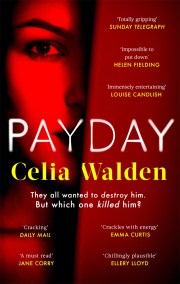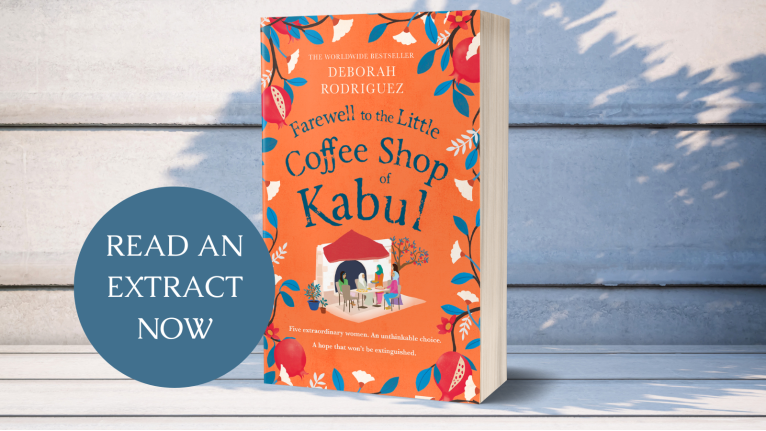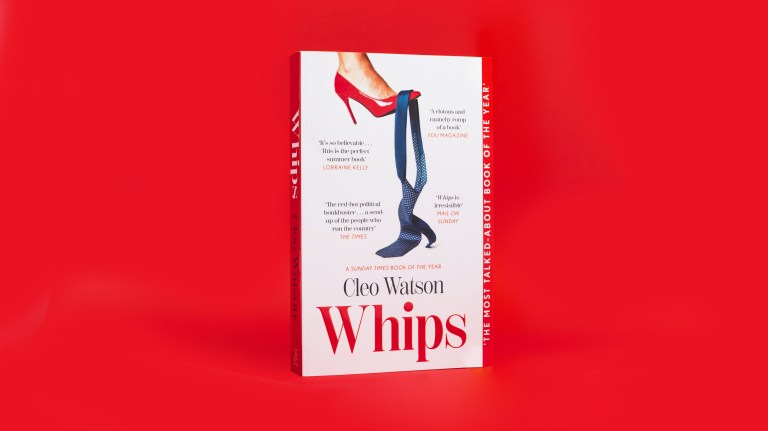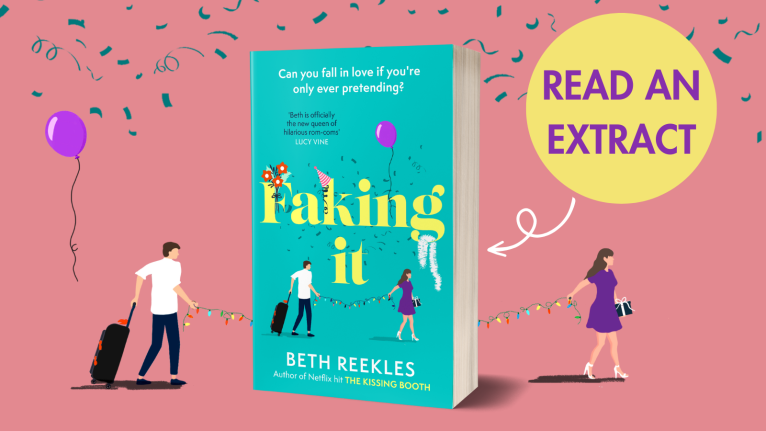Read an extract from Payday: Jill
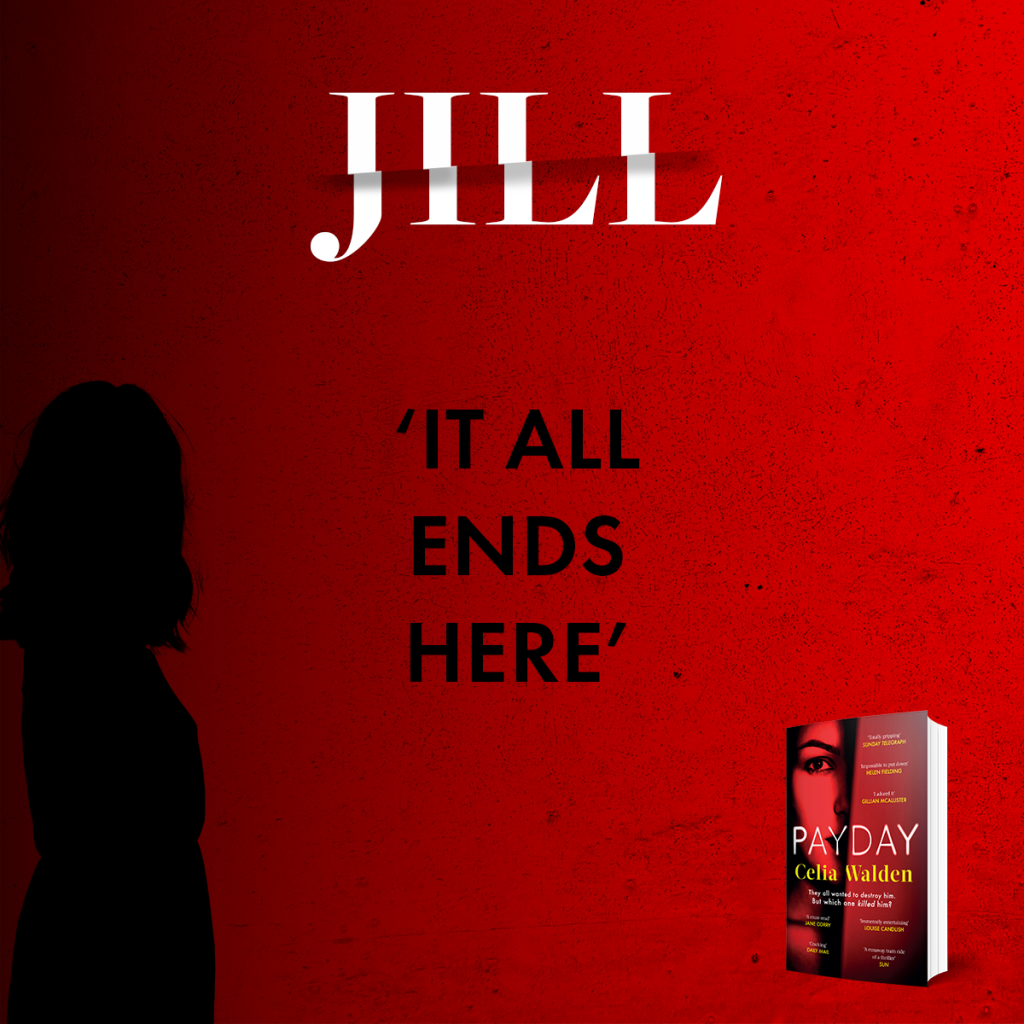
Jill
Thursday 5th August
Pick up, pick up, pick up.
Sitting in her driveway in a blouse, work skirt and fleece- lined slippers, Jill stared at the single letter on
her iPhone screen. ‘A’. The initial felt like an admission of guilt. As her employee it would have been natural for Alex
to figure in her scroll of contacts, professional and personal. Only nothing about Jill’s connection to ‘A’ was legitimate,
let alone justifiable – and as of half an hour ago, she had everything to hide.
Welcome to the O2 messaging service. The person you are calling is unable to take your call.
People don’t tell you that chaos has a sound: a churning, crashing, intravenous beat. And it’s deafening. They don’t
tell you that once you’ve invited that white noise into your life, there’s no way of turning it off.
Terminating the call – leaving a message was too risky, and with the four previous attempts to reach Alex, Jill had
already taken the precaution to hide her caller ID – she slumped forward to rest her forehead on the steering wheel,
forcing herself to breathe. In, out; in, out – slowly now, slowly. Each exhalation misted up the winged chrome logo at
the centre of the wheel, and she watched it dissipate in hazy patches before breathing out once more.
The police said they’d be in touch. That was what Paul had said. It could be hours. Or it could be minutes. And she couldn’t have that conversation without having spoken to Alex.
‘Where are you?’ Out loud, the words were startling. Imperious. And she wondered what the neighbours would think if they saw her sitting in her car, talking to herself. She wondered whether Stan, inside, had noticed her absence yet, and how much a human being could withstand before, like an overloaded electrical system, they cut out.
The buzz of her phone brought her to, but it was only another message from Paul. It’s on the news. With fumbling fingers she slotted the key into the ignition, switched on the radio and sat numbly through an amped- up exchange between an LBC presenter and a vegan campaigner before, finally, they cut to the news. Jamie was third on the bill. Only he was no longer Jamie, but ‘a forty- six- year- old man, found impaled on railings on a north- west London building site’.
It was only a matter of time before the office found out that the dead man was their boss, and as a reporter ‘at the scene’ delivered details she could never unhear, Jill pictured the news spreading in startled cries and wild, unpunctuated emails from desk to desk. She saw hands clamped across mouths, tears of disbelief: mayhem. As Jamie’s partners, it was up to her and Paul to make an announcement; ‘manage’ the fallout. But going into work was also unthinkable – until she’d spoken to Alex. Then there was Nicole.
Her colleague’s name wasn’t disguised by an initial, although it should have been, and the sight of it on her phone screen made Jill feel no less toxic. Her own name would have a similar effect on these two women, she realised. They were bound by that, now.
You’ve reached Nicole Harper. I can’t come to the phone right now, but you know what to do . . .
That both women were going to voicemail, despite repeated attempts, wasn’t right. But then none of this was right, and what could Jill do, but try, try, try again?
‘Hello?’
Nicole’s voice sounded artificially bright, as though put on for her benefit. Then Jill remembered her withheld number.
‘It’s . . . ’ She cleared her throat. ‘It’s Jill.’
‘One sec.’ A party blower blared in the background, followed by a discordant jumble of childish joy. ‘Sorry, who?’
She heard the jingle of a door swinging shut, all jollity sealed off behind it.
‘It’s Jill.’ She closed her eyes.
‘Sorry, I’m at a kids’ party with my daughter – they’re about to bring the cake out. Can I call you back?’
‘No.’ She had to stop Nicole talking and make her listen.
‘Jamie’s dead. They found him this morning. The police want to talk to me. They’ll want to talk to you, too.’ The words came out in a rush. ‘And Nicole –’ she heard her own voice dip down ‘– I can’t get hold of Alex.’
There was a muffled clunk at the other end of the line, followed by silence. Then another clunk, and a whisper: ‘How?’
‘They don’t know yet. He was found by the Vale Theatre early this morning. There’s a building site behind—’
‘He was at the theatre?’
The change of tone made Jill sit up straight. It wasn’t just alarm, but recognition.
‘If you know something . . . ’
At the end of the line Nicole let out a faint moan. Then there was a choking noise. And as Jill waited she saw her own slippered foot tapping impatiently by the pedals. There wasn’t time for this.
‘We’ve got to find Alex.’
Silence.
‘Nicole, are you there?’
‘The theatre . . . there’s this little glass hut on the roof . . . ’
The rap of knuckles against glass made Jill jump, every synapse now on high alert, every word Nicole was saying
drowned out, and she looked up to see Stan’s face peering in at her.
British journalist Celia Walden’s bestselling debut thriller is a thrilling, searing examination of sexual harassment and the messy nuances of justice. Payday is out now in hardback, ebook and audiobook or you can pre-order your paperback copy below.
THE RICHARD AND JUDY BOOK CLUB PICK FOR AUTUMN 2022
Can YOU guess who killed Jamie Lawrence?
***Don’t miss the new spectacularly entertaining thriller from Celia Walden – THE SQUARE is available to pre-order now***
‘Impossible to put down’
HELEN FIELDING international bestselling author of Bridget Jones’s Diary
‘I adored it’
GILLIAN MCALLISTER Sunday Times bestselling author of That Night
‘Totally gripping . . . Nicole Kidman TV miniseries is written all over it’
SUNDAY TELEGRAPH
‘The final twist genuinely blindsided me’ Reader Review
‘Immensely entertaining’
LOUISE CANDLISH Sunday Times bestselling author of Our House
‘A runaway train ride of a thriller’
SUN
‘Cracking . . . [Payday] rips along, full of tension and drama’
DAILY MAIL
‘A must read’
JANE CORRY Sunday Times bestselling author of My Husband’s Wife
‘Prepare to be wrong-footed at every turn’
CAZ FREAR Number One bestselling author of Sweet Little Lies
‘Highly recommended, I cannot fault it‘ Reader Review
______________________
Late one night, three women share secrets.
They barely know each other, but they all know Jamie Lawrence. They know what he’s guilty of. And they agree something must be done.
But as their plan spirals out of control, they begin to doubt themselves . . . and each other. Then Jamie is found dead. And suddenly everything is at stake. As lies are unravelled and truths exposed, two urgent questions emerge:
Who is really guilty?
And who will have to pay?
______________________
‘This year’s most electrifying ride’ CHANDLER BAKER New York Times bestselling author of Whisper Network
‘Sensational’
TONY PARSONS Number One bestselling author
‘Ratchets up the tension until the final couldn’t-see-it-coming twist’ ELLERY LLOYD author of People Like Her, a Richard & Judy bookclub pick
‘I absolutely loved it. It’s unputdownable, a great mystery and a fantastic read’
BARBARA TAYLOR BRADFORD international bestselling author
‘An intelligent, thought-provoking story with some great twists’
ALLIE REYNOLDS author of Shiver
‘Gripping from the start’ Reader Review
‘I inhaled it’
JESSICA FELLOWES international bestselling author of The Mitford Murders
‘Crackles with energy and the plot whipped me along’
EMMA CURTIS bestselling author of One Little Mistake
‘I could not put it down’ Reader Review
‘Really compelling . . . the characterisation is excellent’ Reader Review
‘A page turner that will provoke many a debate’
C.J. COOPER bestselling author of The Book Club

